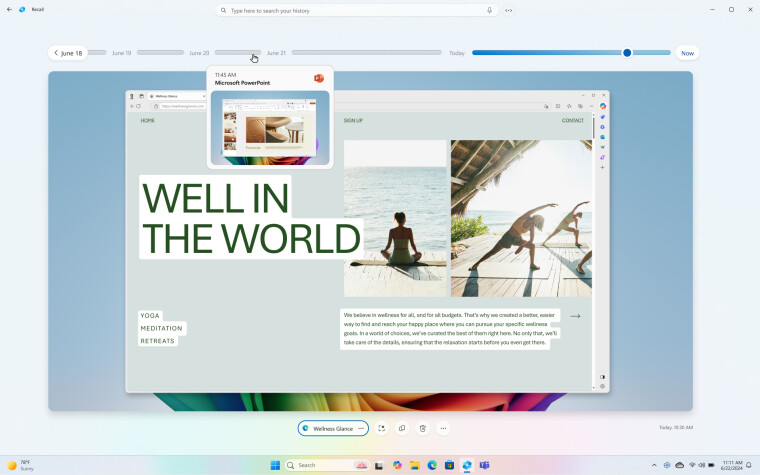Oh, you’re saying that Recall is a privacy nightmare and a sweet target for malware? Surprised_pikachu.jpg
This has already been happening on the Web for quite some time. For example Microsoft Clarity records everything you do on those dodgy Web sites you visit. And they assign a universal identifier to you that can be correlated with the IDs Google and your device have already created and broadcast to profile you.
And you think “oh but I use x, y, and z to prevent tracking”. Guess what: They make your browser do nonsense tasks in the background to benchmark your hardware and then assign a UUID to you based on that.
The only thing that can help this situation is privacy legislation with real teeth.
This is far far worse of a potential risk than a tracking identifier. Bank passwords, balances, social media pages, full text chat Windows, everything you ever view all OCRed and put in a neat searchable database for a hacker.
My main point is that “observability” tools like Clarity are screen grabbing whole Web sessions and have been for some time.
But Clarity is an app a web developer adds to their own web site. So, yeah a website you visit sees everything you do on their website.
That’s not new.
Screen capping everything on your PC at all times is new.
Yes the developer sees it, and also the data brokers they sell all their user data to see it, aggregate it, and corollate it. Not to mention whatever Microsoft does with it.
I would be interested in learning what people find objectionable about my comments, if anyone would care to share.
Do you have a few minutes to talk about our Lord and Saviour, Linus Torvalds?
And Saint Ignucious, RMS, of course.
I can’t imagine why the windows 11 market share is dropping.
Is it? Even if it is, it’s probably dropping in favour of win10, rather than Linux.
Windows 11 market share has been going down, while Linux market share has been going up by a few percent. I doubt that people are going back to an older OS. But even if that’s the case: These Windows 10 users will eventually have to find some other OS, as Win 10 won’t get security updates after 2025. Sure, not all of them will switch to Linux, but I’m sure that a notable portion of them will.
I wish I shared your optimism. Most likely most regular users won’t care about not getting security updates, some of the ones that do will switch to Linux, but the majority (of the minority of people that care about getting security updates) will probably switch to win11, macOS, or ChromeOS (which might as well not be based on the Linux kernel seeing as it’s so locked down).
No actually they nailed it, Windows 11 is losing ground to Windows 10 lol! (Sorry about the crap source. There are plenty of others from the same time frame, I’m just lazy. )
My personal guess is that’s just because people aren’t buying new systems right now, but that’s just a guess.
We’ll see if MS holds strong on their Windows 10 phase out date, though. There will be a LOT of pressure to delay that, I think.
Like others have mentioned it is dropping in favor of 10 but some who are knowledgeable are moving to Linux as well. Corporations are looking into shifting to alternatives (Linux) as windows 10 loses support… and becomes very expensive per user to keep after Microsoft drops it.
I am dreading the day my company makes me “upgrade” my windows 10 laptop to 11. I really hope they’re paying for legacy support for 10.
I right click, soooooo often when managing files at my job. I’m going to pull out my hair if I can’t change the “see more” behaviour.
Also, I’m a top taskbar user (that’s where programs put their tabs, it just makes sense!)
I don’t know how they could fuck up windows this badly.
Jesus fucking Christ. This might be enough for me to actually attempt Linux on my laptop. My main reason for not doing so is because I’ve done Linux on a laptop before and it went horribly.
Try a few distros on USB drives first (I like Pop OS). No risk that way as you’ll be able to test them to see if everything works without installing.
The problem isn’t necessarily whether it will work on not. I’m fairly certain it will work 90-95% of the time. And that might be enough. But it’s that last 10% where I might need to do something right now and it will only work in Windows and will only work on bare metal.
I hit that use case maybe once a year. Last year I was helping someone read an old thumb drive they had with some important pictures on it. It was formatted with some old version of NTFS and wouldn’t mount on my linux desktop. It opened completely fine in Windows…which also gave me a virus.
Thanks a lot Kevin.
I switched to Linux on my laptop full time ~6 months ago. If had to reinstall my OS a few times since to fix issues, but pop_os (what I am using) has a nice feature that keeps the home folder. All my data is preserved and OS is refreshed (Windows has this as well)
It’s a lot easier than it used to be. I moved to Nobara (gaming-centric fedora distro that does all the install work for you) maybe two months ago and haven’t been back.
While a few things have required some tweaking, almost everything runs fine out the box and I’ve only had to use the console to troubleshoot one issue so far.
Throw a couple distros on a thumb drive and give one a try
Do it!
This feels like me. But I read somewhere that even if I am on windows 11 ,my current laptop won’t have this feature. So I think I’m okay for now. Maybe my next one will be Linux.
I’ve used Linux before and I kind of hated it. It was fine for me when I had time to fuck around with every setting and go into rabbit holes. But I don’t know if it’ll work on a family device. I have 1 laptop in the house and myself, my wife, and kid all use it. Other than that, all devices are just tablets or phones.
We use the laptop for browsing, casting, document editing, and that’s about it I think. So since it’s that simple, I would hope Linux would “just work”. But we’ll see on my next device.
Linux Mint is real nice from the ‘it just works’ perspective. Common things like you mention are preinstalled and the default (cinnamon) UI feels very familiar coming from Windows.
Back to this comment to report that I took the dive. I have a second laptop that wasn’t getting used so I wiped it and installed Linux mint. Love it so far and no issues with any of the basics. Took me all of 1 hr to get up and running.
Fuck yeah man! Glad to hear it is working well for you so far! <3
If it works well (and I mean very well), I will consider doing the same on my main machine. The one the family uses. Maybe just set it up so I boot both windows and Linux… Either way. Very happy with the results so far.
I’m currently using it on my HTPC and laptop with pretty good results on both. Going to switch over on my main machine in the near future as well, whenever my next format is, which will probably be when Win 10 goes EOL.
Main growing pains for me has been just re-learning stuff I previously knew. But, I’m really liking that I feel like I’m in charge of the OS again, the same way I felt back when Win 7 was a thing and the OS did its best to get out of your way.
I do like the control aspect. I also really enjoy how clean it feels compared to windows.
Good to know and thanks for the tip. This was back when I did more on a personal computer, but I remember spending hours just trying to get software to work. Again, this isn’t something I need to worry about today, but getting Octave (free version of Matlab) to work on Linux was a nightmare.
Or you could just turn the feature off. Or just not enable it in the first place, as it’s possibly illegal to do this without showing an allow/disallow prompt at least - so just don’t click allow. Just saying.
Just keep breathing in that copium, while Microsoft already specifically starts banning programs that are a curated-ish list of privacy-sensitive things to disable on windows at one click.
So are you or are you not implying that this would be quietly enabled without explicitly prompting the user?
If they can get away with it, by maybe burrying it in page 137 of the EULA, then yes.
I vaguely remember win 8 coming with lots of invasive features, that were able to be disabled by a application which had such lists of registry edits needed.
Also: Microsoft backports privacy-invasive features to windows 7 and 8 Many of these have effectively hidden Customer Experience Improvement config values in “help” menu of the program.
Oh yes, because proprietary software created by greedy, user-hostile, profit-extracting Big Tech corporations can always be trusted. Microsoft would never steal people’s data without telling them about it.
This software is a security nightmare for any government that uses Windows. Absolutely no one is going to trust their nation’s security to an operating system with such a blatant backdoor built into it.
Why would they ever stop with their ridiculous bullshit? As far as I can tell they get no pushback from users because the masses just roll blissfully along, and the tech-knowledgeable who still use Windows just find out how to disable the things they don’t like, shrug, and move along.
It’s really clear by now that you are nothing but a datamine for MS if you are a home user, right?
Obviously there’s a similar tool which is open source cross platform and available for years: https://github.com/dynobo/normcap Just in case sb liked the idea. This doesn’t automatically ruh on your computer, if I understood it correctly.
deleted by creator
For anyone who still wants to use W11 but with its crap ripped out, ReviOS is your saviour.








